Claude Plessier (born 1946, Paris) is a French painter, who has worked in France and Argentina.
A graduate of the Arts Décos, the Beaux-Arts and the Allgemeine Gewerbe Schule in Basel he was awarded a scholarship by the Italian government to study mosaic in Ravenna in 1971. He has lived and worked in Paris since 1978.
Initially, his paintings were in an abstract manner very much under the influence of the COBRA (avant-garde movement) movement; he has even been called a Neo-cobra painter. His stay in Argentina (1973–1977) saw a radical change in his work. He has since been noted for his liberal and skillful use of vivid and contrasted colours and his enigmatic figures drawn without perspective at various scales and on various planes, sometimes emerging from a layer of paint beneath another one. In his "recouvrements" series, he sometimes even covered older works with thick layers of black paint.
In his recent paintings he has used lighter colours, and the figures are less numerous.
Plessier has also made a series of drawings in homage to Gabriel García Márquez, and a portrait on wood of the author.
His work has also been shown in Paris at the Salons de Mai, Jeune peinture in Montrouge and Figuration critique.
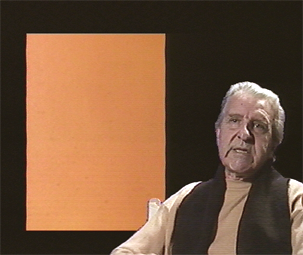
Fernand Leduc was a Canadian abstract expressionist painter and a major figure in the Quebec contemporary art scene in the 1940s and 1950s. During his 50-year career, Leduc participated in many expositions in Canada and France. He was born in Viauville, Montreal, Quebec.

Árpád Szenes was a Hungarian-Jewish abstract painter who worked in France.
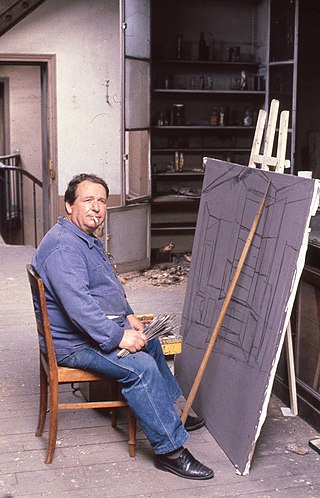
Jürg Kreienbühl was a Swiss and French painter.
Pierre Tal-Coat was a French artist considered to be one of the founders of Tachisme.

Henri Richelet was a French painter.
Bouchta El Hayani is a Moroccan artist who started his professional career in the 1970s. Since this period he has followed a successful path to become one of the leading and most famous Moroccan artists. First and foremost he is one of the rare Moroccan painters that perfectly master drawing techniques.

Pierre Schwarz is a contemporary Belgian painter and engraver, neo-expressionist and muralist.
ShaficAbboud was a Lebanese painter. He studied at the Académie Libanaise des Beaux-Arts ALBA and left to Paris in 1947. Although he spent most of his life in France, he is considered as one of the most influential Lebanese artists of the 20th century.

Fausto Olivares Palacios (1940–1995) was an Andalusian painter born in Jaén. He studied Fine Arts in Madrid. He traveled to Paris and other cities in Europe before returning to Jaén in 1966, where he taught drawing and painting at the School of Arts and Crafts, where he served later as director.
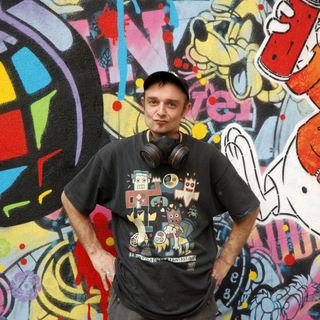
Speedy Graphito is a French painter who is considered a pioneer of the French Street Art movement.

'Jean-Marc Rives' is a French singer tenor, musician, painter, poet, philosopher and writer. He is son of French father and French mother of Italian origin. He was born 16 November 1950, in Rabat. He is known for his paintings, concerts, records and literary works. He is also known for saxophone and Music Instruments. His work of art is constituted from over 500 paintings, all figurative and modern. Jean-Marc Rives was named Academician at the Greci-Marino International Academy in 1997 and elected Knight in 1999. He also obtained the Excellence Prize in the Grand Prix International des Seigneurs de l'Art in 1997.
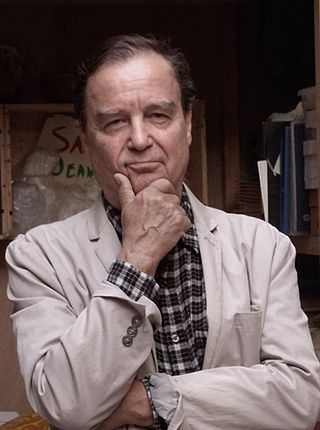
Jean-Max Albert is a French painter, sculptor, writer, and musician. He has published theory, books on artists, and a collection of poems, plays and novels inspired by quantum physics. He perpetuated experiments initiated by Paul Klee and Edgar Varèse on the transposition of musical structures into formal constructions. Albert has also created environmental sculptures using plants to create architecture.
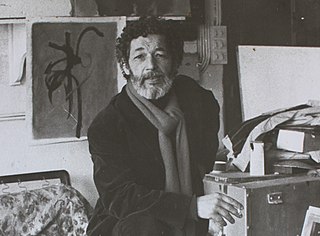
Jorge Brito (1925–1996) was a painter, sculptor and muralist. He is famous for having signed the Manifesto of four young artists distributed at the opening of the National Art Exhibition of Buenos Aires, in which four art students opposed the institution and identified their opponents as the "stonecutters". In the pamphlet, they questioned the orientation sought to be imposed on art education, by both mediocre winners and the "vanguard" jurors who rewarded them. The manifesto was signed by Jorge Brito, Claudio Girola, Tomas Maldonado and Alfredo Hlito who, in 1942, were students of the National School of Fine Arts Prilidiano Pueyrredón.
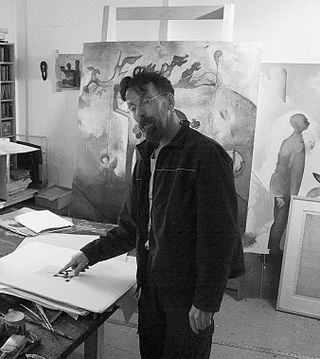
Louis-Pierre Bougie was a Canadian painter and printmaker specialized in engraving and etching. He developed his knowledge of intaglio techniques at Atelier Lacourière-Frélaut in Paris, where he worked for fifteen years, and through travel and study in France, Portugal, Poland, Ireland, Finland, and New York. His work is regularly shown in Canadian, American, and European galleries, and is represented in major public and private collections, notably in Québec and New York. Bougie was considered Québec's foremost engraver for the depth and consistency of his work. He died from pneumonia.
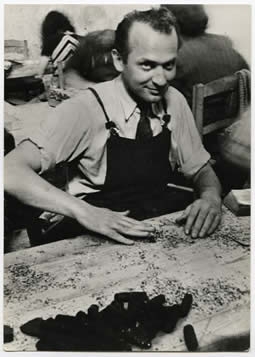
Jacques Hérold was a prominent surrealist painter born in Piatra Neamț, Romania.

Juan Nicolás Melé was an Argentine sculptor, painter, and art critic. Melé was a member of the Asociación Arte Concreto-Invención as well as co-founder of the Grupo Arte Nuevo.

Charles Kohl was a sculptor, painter and lecturer from Luxembourg.
Paul Rambié was a French painter.

Jean Degottex was a French abstract painter, known in particular for his initial proximity with the lyrical abstraction movement of the 1950s and 1960s. He is considered an important artist of the abstraction movement in the second half of the twentieth century and a significant inspiration for contemporary art. Degottex was particularly inspired by East Asian calligraphy and Zen philosophy in achieving the erasure of the creative subject.
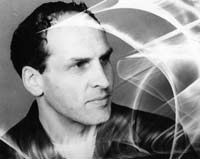
Étienne Bertrand Weill (1919-2001) was a French photographer. His primary works were abstract Metaforms.